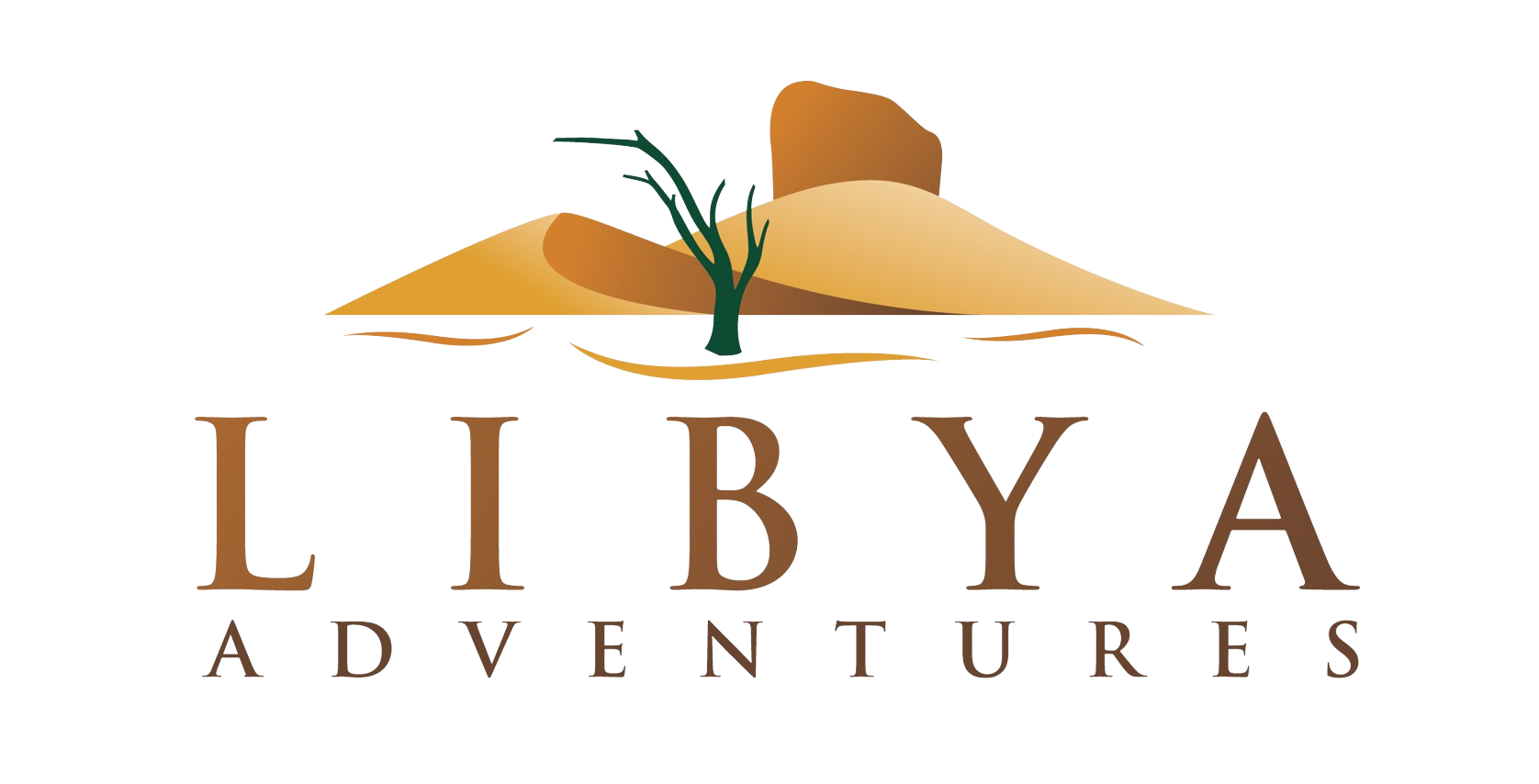Discover Libyan Ramadan Traditions 2024. Libyan Ramadan Traditions is one of the five Pillars of Islam. It is the month of fastening for Muslims worldwide. The month lasts for 29 to 30 days based on the Islamic calendar, which depends on the moon movement. Each year, the people of Libya receive the month with great passion and joy, they get ready for it as if waiting for a special guest; thereby Ramadan is commonly named the Guest.
During Ramadan, Libyan Muslims observe various traditions and practices. Fasting from dawn to sunset is the main focus, where no food or drink is consumed during daylight hours. The evening meal, known as iftar, is eagerly awaited and often shared with family and friends. Mosques are filled with worshippers engaging in Taraweeh prayers, which are extra prayers performed at night. Charitable acts are also emphasized during this holy month, with many Libyans giving to the less fortunate through donations and acts of kindness.
This year, Ramadan is expected to begin in the evening on Sunday, March 11, 2024 and end on Tuesday, April 10, 2024.
Getting ready for Ramadan comes on official and popular fronts, school, work and even TV programs, all schedule their work and fix their plans to meet with Ramadan’s requirements.
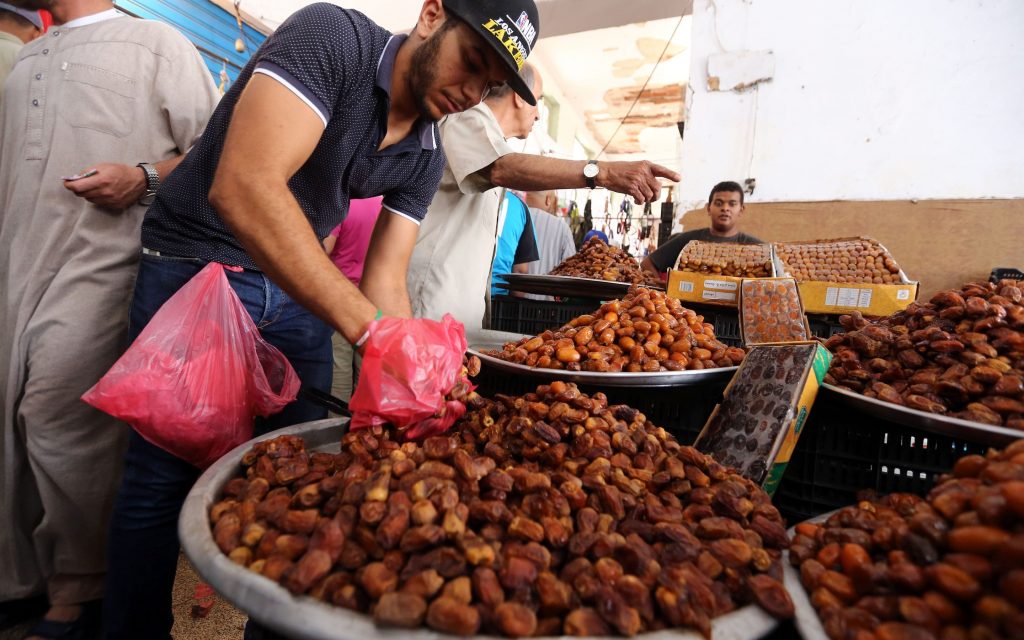
Preparation starts ahead of time and at all levels. Mosques are maintained and lamps are lit on the minarets and fences of the building to receive the pioneers and worshippers who inhabit the mosques throughout this blessed month.
People in this month are more engaged in reading the Holy Quran and attending religious lessons and sermons, besides participating the Taraweeh and Tahajud night prayer, where mosques are crowded with worshippers of men, women and children in an immense passion scene, which characterizes this month.
In Libyan Ramadan Traditions, women usually like to make changes in their kitchen and acquire new kitchen utensils and dishes to present food for the family after a long fastening day, in the best possible way.
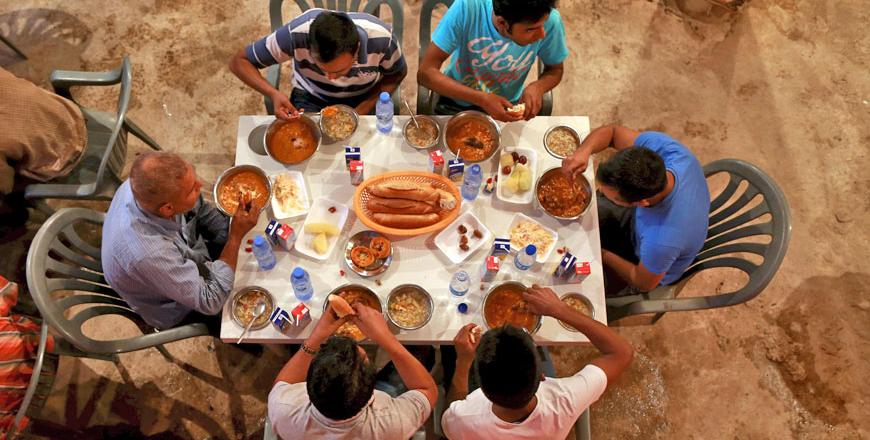
The Libyan Ramadan Traditions dinner table is rich in various foods from which shared with other Arab and Islamic tables consisting of dates, milk, fruit juices, meat, rice and other nuts and sweets, but still the Libyan traditional soup always center’s the stage. However, public awareness campaigns on food waste reduction and its impact at all levels are intensified in this month through different means including media, to educate the public.
Exchanging food between neighbors at sunset (breaking fasting time) is one of the very fine Libyan traditions and customs in Ramadan, besides other Various manifestations which are truly admirable, including Collective eating in the street prepared by citizens or charitable organizations.
breaking fasting together with neighbors in the mosque where everyone is keen on bringing anything with him on Maghrib prayer however simple it was, perhaps dates or a carton of milk, to share with others in the Mosque or to present it to those who were on the road and couldn’t make it at home in time, and in exchange people try to show the better of them and throw all their sinful behavior that contradict to the spirit of Ramadan and Islamic principles and which may negate the reward of fasting.
During this difficult, transitional period of the country, Libyans look to these Islamic values of life that are revived in Ramadan to have their impact in promoting stability, peace and harmony within Libyan society.

Being aware of the fact that Muslims are allowed to break their fast in case of a health emergency is crucial. Fasting is intended to be a spiritual test, not a danger to one’s health. Individuals who are ill, traveling, menstruating, experiencing postnatal bleeding, or have a medical condition that would be worsened by fasting are excused from fasting and can either make up for the missed fasts later in the year or offer food to the needy as a charitable act.
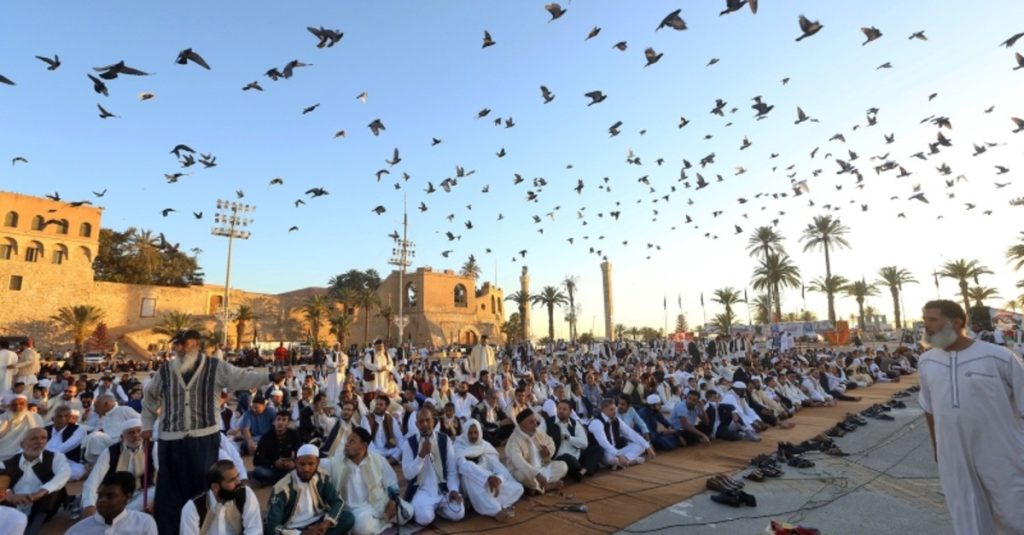
The end of Ramadan is usually a busy period in Libya countries. People traditionally visit their families to celebrate Eid-ul-Fitr, the three day festival marking the end of the fast.
Below are the Ramadan fasting hours for Tripoli, Libya in 2024 (your location inside Libya may cause these hours to change slightly):
| Day | SEHRI | IFTAR | DATE |
|---|---|---|---|
| 1 | 04:28 AM | 5:42 PM | 11 Mar 2024 |
| 2 | 04:26 AM | 5:43 PM | 12 Mar 2024 |
| 3 | 04:25 AM | 5:44 PM | 13 Mar 2024 |
| 4 | 04:24 AM | 5:45 PM | 14 Mar 2024 |
| 5 | 04:22 AM | 5:46 PM | 15 Mar 2024 |
| 6 | 04:21 AM | 5:46 PM | 16 Mar 2024 |
| 7 | 04:19 AM | 5:47 PM | 17 Mar 2024 |
| 8 | 04:18 AM | 5:48 PM | 18 Mar 2024 |
| 9 | 04:17 AM | 5:49 PM | 19 Mar 2024 |
| 10 | 04:15 AM | 5:49 PM | 20 Mar 2024 |
| 11 | 04:14 AM | 5:50 PM | 21 Mar 2024 |
| 12 | 04:12 AM | 5:51 PM | 22 Mar 2024 |
| 13 | 04:11 AM | 5:52 PM | 23 Mar 2024 |
| 14 | 04:09 AM | 5:53 PM | 24 Mar 2024 |
| 15 | 04:08 AM | 5:53 PM | 25 Mar 2024 |
| 16 | 04:06 AM | 5:54 PM | 26 Mar 2024 |
| 17 | 04:05 AM | 5:55 PM | 27 Mar 2024 |
| 18 | 04:03 AM | 5:56 PM | 28 Mar 2024 |
| 19 | 04:02 AM | 5:56 PM | 29 Mar 2024 |
| 20 | 04:00 AM | 5:57 PM | 30 Mar 2024 |
| 21 | 04:59 AM | 6:58 PM | 31 Mar 2024 |
| 22 | 04:57 AM | 6:59 PM | 01 Apr 2024 |
| 23 | 04:55 AM | 7:00 PM | 02 Apr 2024 |
| 24 | 04:54 AM | 7:00 PM | 03 Apr 2024 |
| 25 | 04:52 AM | 7:01 PM | 04 Apr 2024 |
| 26 | 04:51 AM | 7:02 PM | 05 Apr 2024 |
| 27 | 04:49 AM | 7:03 PM | 06 Apr 2024 |
| 28 | 04:48 AM | 7:03 PM | 07 Apr 2024 |
| 29 | 04:46 AM | 7:04 PM | 08 Apr 2024 |
| 30 | 04:45 AM | 7:05 PM | 09 Apr 2024 |
The ninth month of the Islamic calendar is known as Ramadan, and it is a time when people fast from sunrise until sunset. As one of Islam’s five pillars, fasting is required during this month for all physically capable Muslims. The majority of people in Libya are Muslims, and Ramadan is reverently observed.
Suhoor, a meal that is eaten before dawn, signals the beginning of the day in Ramadan. This meal, which is eaten before dawn, is intended to keep the fasting person full throughout the day. The suhoor meal often includes foods like lentil soup, bread, eggs, and yogurt along with a combination of proteins, complex carbohydrates, and healthy fats.
Muslims offer the Fajr prayer, which is the first prayer of the day, following suhoor. This prayer, which is given before dawn, is a crucial component of the Islamic daily regimen. The Fajr prayer is a moment for introspection, expressing appreciation, and pleading with Allah for pardon.
In Libya, working hours are frequently changed during Ramadan to accommodate individuals who are fasting. To give Muslims time to recover and break their fast, many companies and organizations open early in the morning and close early in the afternoon.
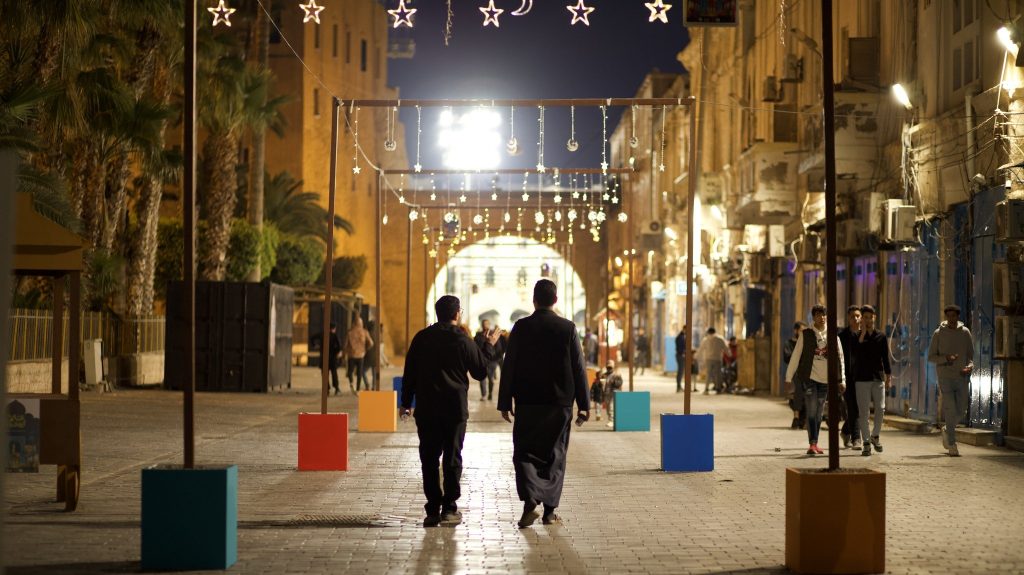
Muslims break their fast with an iftar meal when the sun starts to drop. Family and friends gather for the iftar meal, a time of celebration, to eat traditional Libyan fare such bazeen, couscous, and soup.
Muslims offer the Maghrib prayer, the fourth prayer of the day, following the iftar meal. An integral element of every Muslim day is the Maghrib prayer, which is given just after sunset.
Muslims offer Taraweeh prayers in addition to the five daily prayers throughout Ramadan. After the Isha prayer, these prayers are said, and they are often recited together in mosques around Libya.
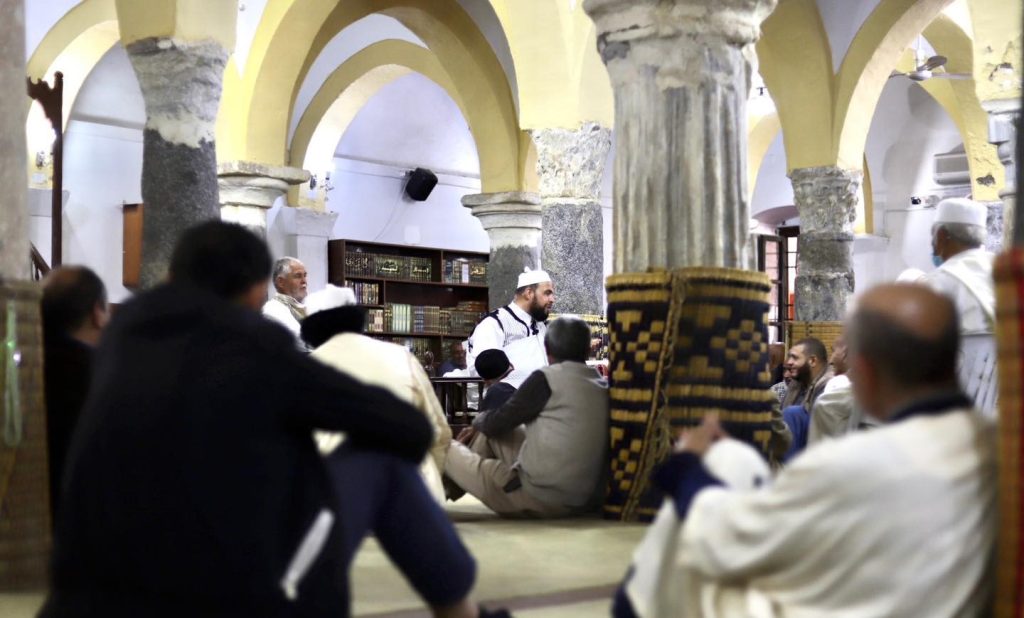
For Muslims around the world, Ramadan is a time of spiritual renewal, introspection, and devotion. Ramadan is enthusiastically observed in Libya, and the daily schedule is modified to meet the demands of individuals who are fasting.
Ramadan is regarded one of the holiest periods for Muslims, being the ninth month of the Islamic calendar. Throughout this month, Muslims keep a strict daily fast from sunrise till sundown, refraining from consuming any food or beverages, including water, during daylight hours.
Some common Ramadan traditions in Libya include fasting, breaking the fast with dates and water, attending taraweeh prayers at the mosque, and preparing traditional dishes such as harira soup and shakshuka.
One lunar month, or 29 or 30 days depending on the moon’s sighting, is the length of Ramadan. Ramadan’s exact dates can change from year to year.
It is typical in Libya for people to break their fast with friends and relatives. This is a time for socializing and enhancing relationships with close ones.
Certainly, during Ramadan, Libyans enjoy a variety of special dishes and beverages. Shakshuka, couscous, and harira soup are a few popular foods. A sweet apricot juice known as qamar al-din is also popular.
Although there aren’t any official restrictions on what you can do during Ramadan in Libya, it is considered polite to refrain from eating, drinking, or smoking in public during the day.
Yes, businesses in Libya often adjust their operating hours during Ramadan. Many stores and restaurants will close during the day and open later in the evening to accommodate those who are fasting.
Yes, there are several special religious observances during Ramadan in Libya, including taraweeh prayers, recitation of the Quran, and itikaf, which is a period of seclusion in the mosque for spiritual reflection.
Ramadan Kareem, which translates to “Generous Ramadan,” is a customary way for Libyans to greet one another during the holy month of Ramadan.
The Muslim holiday of Eid al-Fitr is marked with feasting and celebrations, as well as the giving and receiving of gifts and donning of new attire. Giving children money is another common ritual that serves as a sign of blessings and kindness.
raditionally, Libyan Ramadan meals are rich and diverse, reflecting the cultural heritage of the region. Some staple foods include “Soup Erbea,” a hearty soup made from grains, vegetables, and meat, and “Sfinz,” a type of fried dough often enjoyed as a sweet treat. Additionally, dishes like “Bazeen,” a thick porridge made from barley flour and served with a meat or vegetable stew, are commonly prepared during Ramadan in Libya. These dishes are not only delicious but also provide the necessary sustenance for fasting individuals during the month.Soup Erbea, Sfinz,
Bazeen
Hearty and diverse meals
Reflect cultural heritage
Ramadan in Libya is celebrated with fervor and devotion. Families come together to share meals before the sunrise (Suhoor) and after sunset (Iftar), fostering a sense of unity and community. Mosques are filled with worshippers attending Taraweeh prayers, special nightly prayers during Ramadan. Additionally, charity plays a significant role during this month, with many Libyans engaging in acts of giving to those less fortunate. Overall, Ramadan is a time for spiritual reflection, family bonding, and acts of kindness in Libyan culture.
Suhoor and Iftar meals
Taraweeh prayers
Emphasis on charity
Several customs are observed during Ramadan in Libya, adding depth and meaning to the month-long observance. One such custom is the firing of cannon shots to mark the beginning and end of fasting each day. This tradition dates back centuries and remains a significant part of Ramadan festivities in Libya. Another custom is the decoration of homes and streets with colorful lanterns and lights, symbolizing the festive spirit of the holy month. Additionally, families often gather to listen to recitations of the Quran, further deepening their spiritual connection during Ramadan.
Firing of cannon shots
Decoration with lanterns and lights
Recitations of the Quran
Eid al-Fitr, marking the end of Ramadan, is celebrated joyously in Libya. The day begins with a special prayer known as the Eid prayer, performed in mosques and open spaces, attended by individuals dressed in their finest attire. Families exchange gifts and greetings, while children receive money known as “Eidiyah” as a token of celebration. Traditional sweets like “Maamoul” and “Basbousa” are prepared and shared among friends and relatives. Eid al-Fitr in Libya is a time of happiness, gratitude, and renewed spiritual energy.
Eid prayer
Exchange of gifts and greetings
Traditional sweets
Libyan traditions during Ramadan are deeply rooted in cultural values of hospitality, generosity, and community. The emphasis on sharing meals with family and neighbors highlights the importance of kinship and social cohesion. Furthermore, the practice of giving to those in need underscores the value of compassion and solidarity within Libyan society. Additionally, the preservation of age-old customs such as cannon firing and Quran recitations serves to maintain cultural identity and heritage, connecting present-day Libyans with their past.
Hospitality and generosity
Emphasis on community
Preservation of customs
” We have spent years traveling in search of the best for our clients. Now, learn what makes our worlds go around.
